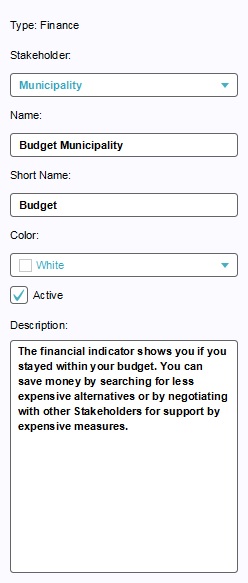Budget (Indicator): Difference between revisions
mNo edit summary |
mNo edit summary |
||
| Line 4: | Line 4: | ||
The budget of a [[stakeholders|stakeholder]] is the amount of money that stakeholder has available to perform actions during a session. | The budget of a [[stakeholders|stakeholder]] is the amount of money that stakeholder has available to perform actions during a session. | ||
==How is the budget indicator implemented in the | ==How is the budget indicator implemented in the {{software}}?== | ||
[[File:indicator_editor_screen_-_budget.jpg|framed|right|The right panel with the budget indicator selected.]] | [[File:indicator_editor_screen_-_budget.jpg|framed|right|The right panel with the budget indicator selected.]] | ||
The budget [[indicators|indicator]] displays the amount of money a stakeholder has available. The budget is influenced by virtually all actions taken by a stakeholder. For example, placing a construction in the world will lower the budget of a stakeholder. Some constructions also provide money to the stakeholder, increasing their budget. | The budget [[indicators|indicator]] displays the amount of money a stakeholder has available. The budget is influenced by virtually all actions taken by a stakeholder. For example, placing a construction in the world will lower the budget of a stakeholder. Some constructions also provide money to the stakeholder, increasing their budget. | ||
Revision as of 13:48, 14 August 2018
Budget
The budget of a stakeholder is the amount of money that stakeholder has available to perform actions during a session.
How is the budget indicator implemented in the Tygron Platform?
The budget indicator displays the amount of money a stakeholder has available. The budget is influenced by virtually all actions taken by a stakeholder. For example, placing a construction in the world will lower the budget of a stakeholder. Some constructions also provide money to the stakeholder, increasing their budget.
Each stakeholder has a budget, but the budget is only visible to the user when that stakeholder also has a budget indicator. Actions performed are still limited by the amount of money the stakeholder has available, even if the stakeholder does not have a budget indicator. If the stakeholder has a negative budget, they will receive a total score of zero, until the budget is at or above zero of the respective currency.
Indicator targets
The budget indicator has 1 value for a target.
- Amount of money that the Stakeholder needs to earn.
- In thousands, the amount of money that the stakeholder should have left to have this indicator at 100%. If the stakeholder has between 0 currency and the target amount, the score will lie between 0% and 100%. If the stakeholder has a negative budget, the indicator will have a negative percentage.
Indicator properties
This indicator is a stakeholder-specific indicator. This means the indicator is unique to a specific stakeholder. If multiple stakeholders have this indicator, they each have their own separate version, and their targets may differ.
This indicator is represented numerically, rather then with a progress bar.
This indicator functions by tally. The amount added and subtracted results in the current value.
This indicator scores uniformly on the entire session. It is not divided into a separate sub-score per zone.
